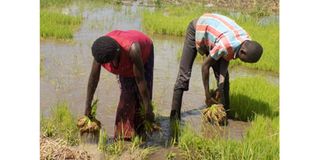Prime
Every day is wetlands day

What you need to know:
- Natural wetlands are being lost at a rate that is three times faster than forests with 85 percent of the world’s wetlands either lost or degraded since 1700.
Every February 2, we celebrate World Wetlands Day to honor the milestones of environmental groups and increase awareness of the need to protect Earth’s natural wetlands for future generations.
This year, the Food and Agricultural Organisation of the United Nations (FAQ), in collaboration with the Ramsar Convention Secretariat and the Italian Ministry of Environment and Energy Security, will host the World Wetlands Day Celebration this Friday.
The day seeks to increase awareness and understanding of the important part of humans and the globe in wetlands, and commemorates the signing of the Ramsar Convention on wetlands in 1971.
A broad definition of wetlands includes both freshwater and marine and coastal ecosystems such as all lakes and rivers, underground aquifers, swamps, grasslands mangroves among others and they are critical to people and nature given the intrinsic value of these ecosystems and their benefits and services including their environmental, climate, ecological, social, economic, scientific, educational and aesthetic contributions to sustainable development and human well-being.
Although they cover only 6 percent of the Earth’s land surface,40 percent of all plant and animal species live or bleed in wetlands, wetland biodiversity matters for our health, our food supply, for tourism and jobs and this certainly shows how wetlands are important to the world and there’s need for collective efforts and responsibility to protect them for us and future generations. We have had international practices like the Paris Agreement in France and others to keep these wetlands for generations.
Uganda, like any other country in the world in addition to its Constitution, has put up organs like National Environment Management Authority (NEMA), enacted laws like the national Environment Act, NEMA act, regulations among others to protect the wetlands. But there is a lot to be done at a time when the world is grappling with the rampant negative effects of climate change and environmental degradation.
Natural wetlands are being lost at a rate that is three times faster than forests with 85 percent of the world’s wetlands either lost or degraded since 1700. Protected areas like swamps are being drained and encroached to the extent that private individuals are owning free hold land certificates and human activities like construction, pollution, and over fishing which degrades these wetlands.
Therefore, before we get to the exciting stuff to celebrate the World’s Wetlands Day and reflect on how humanity has been treating our wetlands, let’s face it. There’s no denying the gravity of the problem. That we have been poor custodians.
The earth is facing a plethora of planetary crises, climate disruption, nature and biodiversity loss, pollution and waste that is threatening the well-being and survival of millions and millions of people around the world. The building blocks of happy healthy lives-clean water, fresh air, and a stable and predictable climate is at stake.
We must take action as we celebrate World Wetlands Day. We must wake up every day to fight for it to justify the celebration. All governments including the government of the republic of Uganda must appreciate the right to a clean and healthy environment. They must put the UN Sustainable Goals first.
Government bodies, ministries and environmental organisations, institutions of learning, educators, activists and advocates must work with local communities, women and youth to advance environmental progress in areas such as circular economy, climate action and biodiversity protection.
They must advocate for the creation of green industries and jobs that are connected to renewable energy resources, advocate for a greater supporter of organic, local and sustainable techniques and wetland day education programs with resources and solutions to create a more sustainable planet.
Finally, I argue that young people should be more concerned about wetlands and the earth as a whole to raise awareness about climate change, conserve the world’s biodiversity and spearhead the transition from fossil fuel investments to clean renewable energies and modern environmental technologies. Every day is wetlands day.
Comfort Tusingwire, Environmental economist and Chief Executive Officer, Initiative For Green Planet.




